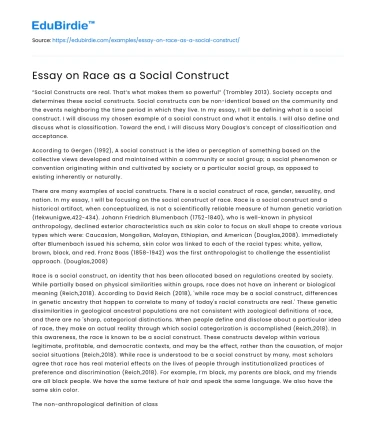“Social Constructs are real. That’s what makes them so powerful” (Trombley 2013). Society accepts and determines these social constructs. Social constructs can be non-identical based on the community and the events neighboring the time period in which they live. In my essay, I will be defining what is a social construct. I will discuss my chosen example of a social construct and what it entails. I will also define and discuss what is classification. Toward the end, I will discuss Mary Douglas’s concept of classification and acceptance.
According to Gergen (1992), A social construct is the idea or perception of something based on the collective views developed and maintained within a community or social group; a social phenomenon or convention originating within and cultivated by society or a particular social group, as opposed to existing inherently or naturally.
Save your time!
We can take care of your essay
- Proper editing and formatting
- Free revision, title page, and bibliography
- Flexible prices and money-back guarantee
There are many examples of social constructs. There is a social construct of race, gender, sexuality, and nation. In my essay, I will be focusing on the social construct of race. Race is a social construct and a historical artifact, when conceptualized, is not a scientifically reliable measure of human genetic variation (Ifekwunigwe,422-434). Johann Friedrich Blumenbach (1752-1840), who is well-known in physical anthropology, declined exterior characteristics such as skin color to focus on skull shape to create various types which were: Caucasian, Mongolian, Malayan, Ethiopian, and American (Douglas,2008). Immediately after Blumenbach issued his schema, skin color was linked to each of the racial types: white, yellow, brown, black, and red. Franz Boas (1858-1942) was the first anthropologist to challenge the essentialist approach. (Douglas,2008)
Race is a social construct, an identity that has been allocated based on regulations created by society. While partially based on physical similarities within groups, race does not have an inherent or biological meaning (Reich,2018). According to David Reich (2018), 'while race may be a social construct, differences in genetic ancestry that happen to correlate to many of today's racial constructs are real.' These genetic dissimilarities in geological ancestral populations are not consistent with zoological definitions of race, and there are no 'sharp, categorical distinctions. When people define and disclose about a particular idea of race, they make an actual reality through which social categorization is accomplished (Reich,2018). In this awareness, the race is known to be a social construct. These constructs develop within various legitimate, profitable, and democratic contexts, and may be the effect, rather than the causation, of major social situations (Reich,2018). While race is understood to be a social construct by many, most scholars agree that race has real material effects on the lives of people through institutionalized practices of preference and discrimination (Reich,2018). For example, I’m black, my parents are black, and my friends are all black people. We have the same texture of hair and speak the same language. We also have the same skin color.
The non-anthropological definition of classification is that “activity in which objects, concepts and relations are assigned to categories; ‘classifying’ refers to the cognitive and cultural mechanisms by which this is “achieved; and ‘classifications’ are the linguistic, mental, and other cultural representations which result”. An example of classifying is assigning plants or animals into a kingdom and species (Durkheim,1901).” Race can also be an example of classification. This is because race is in a form of category. There is the category of white people and black people. Social categories are created by those in power and tend to provide a good space for those who look and act like those in power which means that social classification work against those who do not have power (Durkheim,1901). An example is when black people were forced to do hard work with little to no payment for their hard labor.
Mary Douglas (1966), discusses how society classifies and accepts things. For example, magic. Society accepts white magic rather than dark magic (Mary Douglas,1966). White magic is often used for the good and benefit of the community and black magic is not. Society says black magic is used for selfish or greedy reasons. Society does not accept black magic (Mary Douglas,1966). My classification in society does not allow me to have big dreams. The reason being is that I come from a very disadvantaged background where having dreams of being successful does not matter.
Social constructs are made by society for society. Society decides what they accept and do not accept. The race is an example of my statement. Society decided that race will be a social construct. The race is classified. It is a form of category because there are various types of races that exist in our society. This goes hand in hand with what Mary Douglas, 1966 claims in her article. Society overall classifies and accepts what they choose to classify and accept.
Reference list:
- Gergen, K.J., 1992. The social constructionist movement in modern psychology.
- Ifekwunigwe, J.O., Wagner, J.K., Yu, J.H., Harrell, T.M., Bamshad, M.J. and Royal, C.D., 2017. A qualitative analysis of how anthropologists interpret the race construct. American Anthropologist, 119(3), pp.422-434.
- Reich, D., 2018. How genetics is changing our understanding of ‘race’. New York Times, 23.
- Durkheim, E. and Mauss, M., 1901. Primitive classification, London.
- Douglas, M., 1966. Purity and Danger: An Analysis of Concepts of Pollution and Tats.






 Stuck on your essay?
Stuck on your essay?

